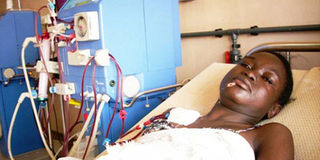When dialysis gives hope and prolongs life for kidney patients

A patient undergoes dialysis treatment at Mulago hospital recently. Many patients who cannot afford a transplant, rely on dialysis. File Photo.
What you need to know:
“A dialysis keeps the body in balance by removing waste, salt and extra water to prevent them from building in the body. It also helps to keep certain chemicals in the body such as sodium and potassium. A person can stay on dialysis for a life time although this can cause side effects and destroy some of the red blood cells in the body.”
It is 3pm and Mr Najib Mustafa arrives at ward 6A- the renal unit of Mulago hospital where dialysis takes place. (Dialysis is the process of cleaning blood by filtering it to remove excess water and impurities using a machine. This function is performed by the kidney in a normal body.)
Patients usually require dialysis when they develop late stage kidney failure. This occurs when two of their kidneys cannot totally function.
Experts say a kidney is described as having failed if a person loses about 80 to 90 per cent of its function.
On average, a person should retain only one litre of fluid in their body in 24 hours. This means that if a person took 10 litres of water in a single day, they should be able to urinate the nine litres that day. And as Dr Simon Peter Eyoku, a nephrologist (kidney specialist) at Mulago hospital explains, most people develop kidney complications because they accumulate a lot of fluids in their body.
“These fluids accumulate when the kidney fails to perform its function of cleaning blood by filtering it to remove excess water from the body where toxins like urea, potassium, sugars and fats are derived,” says Dr Eyoku. It costs Shs90, 000 to undergo a dialysis process- where blood in cleaned through a machine to rid the body of harmful waste, salt and water. An additional Shs160,000 is needed to buy consumables for the process.
A dialysis keeps the body in balance by removing waste, salt and extra water to prevent them from building in the body. It also helps to keep certain chemicals in the body such as sodium and potassium. Tired, stressed and greatly relieved to be here, he is immediately stretched out on a bed and the nurse begins to connect tubes on a vein slightly below his neck – he is going to have a heamodialysis. “I nearly failed to come today, I did not have Shs100, 000 to top up on the Shs150,000 I had,” Mustafa narrates after the process had begun.
“I cannot afford to miss a dialysis. If I miss I feel so bad, I start vomiting, and I cannot walk or stand and my body begins to swell.”
“When the process is over, I can walk, eat, talk, go to the toilet and I am lively again,” he says.
Although doctors are always available, Mustafa says that one has to keep time so that they do not wait to use a machine. It takes four to five hours to complete a dialysis process meaning if one found the machines in use, they have to wait in discomfort for several hours.
The fairly neat room has 16 dialysis machines, 10 of them a donation from a Chinese doctor.
Although doctors recommend dialysis three times a week, Mustafa and many others can only afford to come twice. “When a person cannot buy consumables, there is nothing we can do,’ says Ms Florence Adillu, a nurse at the unit.
“At times, patients come and beg but most of them are considerate and understand that we cannot help them out,” she says. Dr Eyoku says that a person can stay on dialysis for a life time although this can cause side effects and destroy some of the red blood cells in the body.
Besides dialysis, kidney failure can also be addressed through a transplant. This is a process where a healthy kidney is removed from another person and put into the body of the patient. The new kidney takes over the work of the two failed kidneys.
Usually, the donated kidney comes from a living donor or from someone who has just died. Doctors say a person can survive on one kidney. In Uganda though, the biggest challenge for many patients is getting a donor. Today, Mustafa who is also in need of a donor, left the unit a happy man but his search for money to sustain his visits is a daily nightmare he has to live with, otherwise he may not see another day.




